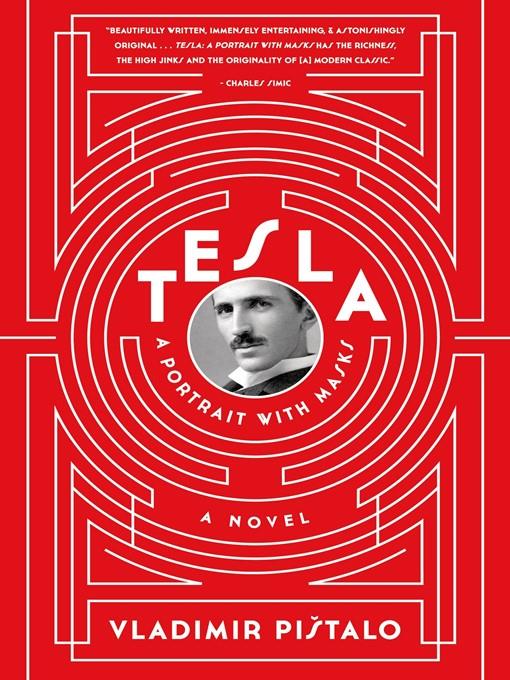
Tesla--A Portrait with Masks
A Novel
کتاب های مرتبط
- اطلاعات
- نقد و بررسی
- دیدگاه کاربران
نقد و بررسی

October 6, 2014
Serbian writer Pištalo’s novel gives a compelling fictionalized account of inventor Nikola Tesla’s inscrutable and solitary life. From a young age, Tesla forsook love as a fool’s distraction that impeded work and serious studies. He worked as a professor in Croatia before moving to the United States in search of Thomas Edison, the greatest inventor of his time. Much to Tesla’s dismay, he soon finds Edison to be a hack who steals ideas from others. He quits his job under Edison and bounces around before finding space to invent again. Soon after, Tesla invents the alternating current electrical system—perhaps his most notable creation. As a result of his success, Tesla meets some of the world’s most important and famous figures, including a memorable encounter with Mark Twain (“If you don’t count thinking,” Tesla tells Twain, “I’m the laziest man in the world”). But his life remains lonely and as Tesla watches many of those around him succumb to disease, addiction, and age, he remains solitary to a fault. The book is episodic with some narration tics: for instance, at times, the unnamed narrator breaks the fourth wall. The book does not rise to the level of mythos associated with Tesla’s story, and is less biography than a fragmented set of impressions, but Pištalo’s thorough account of a great man’s personality and habits is done to fine effect.

Starred review from December 15, 2014
In his first novel translated into English, Pi]talo recounts the tortured, fascinating life of Nikola Tesla, a familiar figure in pop culture and history. This tale charts much of Tesla's life: his fraught relationship with his father, his feud with Edison, his seclusion in old age. But Pi]talo's great achievement is to see beyond the familiar. Absent is the forbidding notion of the "great man" found in many biographies; with the freedom of fiction, Pi]talo shows a fragile but driven individual, easily wounded, somewhat arrogant and tortured by memories of family trauma. Is poetic license taken occasionally? Absolutely. But this isn't nonfiction. Instead, it has the scope of biography, the intimacy of fiction and the elegance of poetry. Pi]talo's fractured structure-with elliptical chapters-provides the sense of a life being lived in front of the reader, moment by moment. (This remains true despite some authorial intrusions, e.g., "At this point of the story, I have to gently but firmly take the reader by the arm....") But finally, there is Tesla himself at the center, a figure from history who, here, seems appealingly modern-a man merely trying "to piece together some sort of meaning for his life." Take, for instance, the early chapters, in which he leaves the comforts of the small village where he grew up to attend school in a big city. There, he has a college experience like any other: meeting combative and supportive professors, struggling with grades and too much partying, and spending long nights sharing new ideas with new friends. Surely many readers will recognize these experiences. This is the great empathetic work that fiction can do: taking a life from the past and making it relatable. A moving, inventive and poetic work of biographical fiction.
COPYRIGHT(2014) Kirkus Reviews, ALL RIGHTS RESERVED.

December 1, 2014
Inventors Nikola Tesla and Thomas Edison--the Bill Gates and Steve Jobs of their era? That's the publisher's fanciful characterization of this account of the life of Serbian-born Tesla (1856-1943), whose numerous inventions include the alternating-current electrical system and wireless communication. Sarajevo-born Pistalo, who won Serbia's prestigious NIN Prize and of whose 11 books of fiction this is the first to be published in English, tracks his subject from lowly village boy through his travels to western Europe then on to America, where he tangles with Edison and George Westinghouse, experiences dire poverty, then rises to renown--"Lady Astor's salon could accommodate only the Four Hundred. Tesla was one of them." Along the way he also rubs shoulders with Rudyard Kipling, Mark Twain, Poland's former prime minister Ignacy Paderewski, and Stanford White, among others. Pistalo's exuberance at times leads to such sentences as "Abstract concepts flew from Tesla's mouth like cosmic winds that powered ethereal engines." Though the author provides a wealth of detail, we don't glimpse Tesla from the inside out. The translation is aptly idiomatic. VERDICT Recommended for readers who enjoy a life story told with pizzazz.--Edward B. Cone, New York
Copyright 2014 Library Journal, LLC Used with permission.

Starred review from November 1, 2014
The crowd cries, He's on fire!, when the daring inventor Nikola Tesla demonstrates the epoch-making equipment pumping high-voltage electricity into his body. The genius of this exceptional engineer crackles again in a novel aflame with the energy of a singular life. From facts that he shares with biographers, Pitalo constructs the narrative spine of his fiction: Tesla's birth to an Orthodox priest in Austria-Hungary, his immigration to the U.S., his rivalry with Edison and Marconi for supremacy in electronic wizardry, his triumph with the world's first alternating-current motor, and finally the career-destroying failure of his attempt at intercontinental energy transmission. But only Pitalo's potent imagination allows him to see beyond the events into Tesla's tortured heart, exposing the proud visionary's existential fears and his strange delusions. Readers share with Tesla an intimate circle, including a friend who dies of a cocaine overdose, a poet who emotionally replaces the brother Tesla loses in boyhood, and the lab assistant who claims Tesla as a surrogate fatherall living out their drama against the backdrop of a larger constellation comprising such luminaries as Mark Twain and Henry Adams, Theodore Roosevelt and Archduke Franz Ferdinand. Thanks to talented translators, English-speaking readers now share a prize-winning Serbian masterpiece.(Reprinted with permission of Booklist, copyright 2014, American Library Association.)

























دیدگاه کاربران